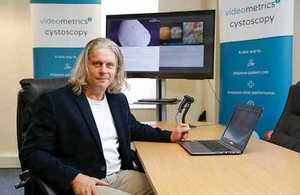Biosignatures: new cancer screening technology set for approval
Innovate UK funding leads to a non-invasive technique to screen for bladder cancer, soon to be available to healthcare providers.

Biogsignatures CEO Will Dracup ... addressing a global need for lower-cost, non-invasive cancer diagnostics.
Newcastle-based Biosignatures was formed by Will Dracup and David Bramwell in 2007, to address the global need for non-invasive and lower-cost cancer diagnostics.
They have developed Videometrics, a software system with improved video imaging and management capabilities for bladder examinations (‘cystoscopies’). It will be available from late 2017 - subject to regulatory approval.
Biosignatures developed Videometrics during the Cystoscopic Imaging Collection and Enhancement (CICERO) project, receiving a £150,000 Biomedical Catalyst feasibility award from Innovate UK.
The award helped Biosignatures increase the size of their team, while the study allowed them to develop the technology on samples from real patients at Newcastle upon Tyne Freeman Hospital.
Technology to meet clinicians’ needs
Endoscopic systems traditionally used to examine the bladder or digestive system have their limitations.
Lighting within the body can be poor, making it difficult for less experienced staff to visually detect abnormalities during examinations. This means that where staff are unsure if a patient has cancer or not they have to bring them back to be seen by a consultant.
Biosignatures worked closely with Dr Rakesh Heer, Newcastle upon Tyne Hospital’s principal clinical investigator on the CICERO study, to ensure the technology was developed to meet clinicians’ needs.
Will and his team found that a hospital using Videometrics could reduce false positive referrals - unnecessary follow-up appointments - achieving savings of approximately £130,000 a year for every 1,000 cystoscopy examinations.
A major factor is that Videometrics’ recording function allows consultants to review an examination after the consultation. Will said:
The funding allowed us to expand the project team and buy kit, but the largest spend was on paying for the trial. This enabled us to collect the data which allowed us to develop the product. The trial also brings us into contact with clinicians, something which would have otherwise been hard to achieve.
The whole process was absolutely key to making sure we were going in the right direction, and I would say the biggest benefit was proving that the product works. We couldn’t have done this without the funding from Innovate UK.
Multi-million pound savings
Bladder cancer is one of the costliest cancers to treat on the NHS. Patients diagnosed with the disease typically receive follow-up cystoscopies 3, 6 and 12 months after diagnosis, as well as an annual check-up for the next 4 years. Videometrics hopes to introduce multi-million pound savings in cost and resource throughout that 5-year monitoring period.
As well as Videometrics, Biosignatures has other products, such as BiopSave, in clinical trials, so the company is looking to grow its workforce ahead of expansion into the US.
Will is positive about the future of Videometrics:
Once the product is launched we will be looking to do a further clinical study, working with clinicians from the previous study to explore how the product can be expanded and used to treat other conditions.
Updates to this page
-
First published.